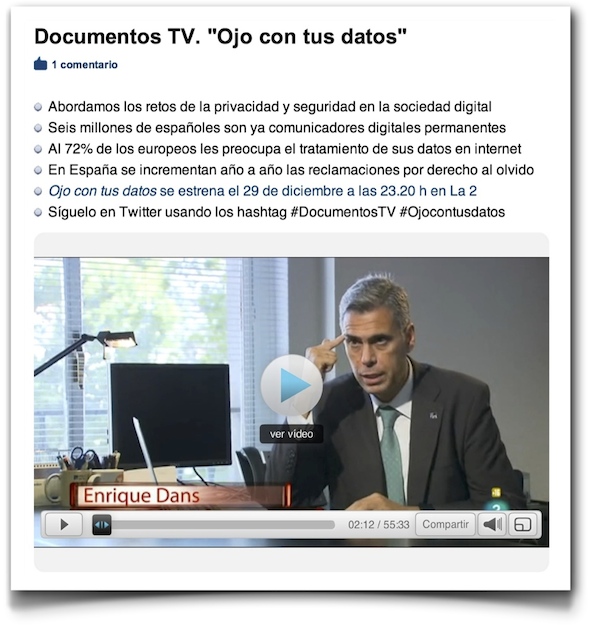In documents TV, RTVE: "Eye with your data"
Yesterday
was aired on 2 RTVE a program titled "Eye with Your data" for whose
recording I contacted Marisol Soto last September. After a long
telephone conversation of more than an hour on September 27th to focus
the issue, we recorded in my office on October 17th. The complete
program is available on the relevant RTVE page.
Also
included were Samuel Parra, Jorge Bluebells, Javier Sempere, Chema
Alonso, Ofelia Tejerina, Rafael García enjoy it, Mario Costejà, Joaquín
Muñoz, Marta Bobo and Jorge Flores,
 |
In documents TV, RTVE: "Eye with your data"
|
We
speak of the nature of the personal data, of its use and conditions of
it, of the proactive management of the image itself, and also, and
abundantly, of a controversial issue that I have not seen in the final
assembly: that of that supposed "right to oblivion" for me completely
nonexistent and tautologically absurd. Oblivion is not, has never been
and should never be a right, because it is a physiological process that
occurs in people's brains. Nothing and no one can force another person
to forget something, and if anyone has any problem with any information
published, should go to the source that published it, not the search
engine that indexes and whose work is precisely that, index. On this
topic I have spoken on other occasions (May 2011, February 2012 and June
2013) in a clear and consistent way, and I still think exactly the
same. If Mario Costejà-or any of the cases mentioned in the program-has a
problem with a news published in the Vanguard or with the means of
information that is, you should go to the forefront or the corresponding
medium, which in my opinion will be able to answer you that this news
actually took place and that you can therefore inform about it if you
consider it relevant. In the same way that before anyone in his right
mind was passed by the imagination request to all the newspaper of the
world that they were tearing up news pages when someone requested it if
the news had turned out erroneous or inaccurate, now you can not pretend
to delete something that is in the network, only request, if necessary,
the publication of a rectification. And in any case, go to the source,
not a search engine whose mission should simply be to search within the
whole set of pages that are allowed to have access.
From
my point of view, another of those cases in which everything the law
says about it was clear before the popularization of the network and the
search engines, keep way after her, and the only thing to do is to keep
applying as it was done, responding exactly to the same logic.
With
regard to issues such as privacy or the use of the network by children,
my opinion is equally clear: I think it is important to promote
education on the terms and conditions of use of the applications and
tools that we use, but always – and especially in the case of children –
I tend to defend, even in schools and with associations of parents ,
that the main danger is to stay out of the net. The huge vision of the
dangers of the network seems wrong and dangerous, and that is, if
possible, my objection to the program: a tone that in many moments
becomes disturbing and tends to highlight the negative, the dangerous,
almost discouraging use. Everything has dangers, including the street,
and not for that reason we are locked up at home. The information can be
used badly, yes. The network can serve to spy on us, and in the middle
of the post-Snowden, we also know that it has been so. But this should
serve to defend our rights and demand governments to stop, not to
encourage us to stay out of the network (more knowing that much of that
espionage has also had place outside the network, in media as old as the
phone). Education, the more the better. Complete and efficient
communication to understand the possible problems and be able to react
if they happen, too. Defending our rights, all. Fears, the least
possible.
0 comentarios: